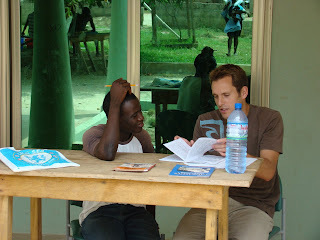




In most cases, the students at the center have not had access to a proper education. The young man in the photo below has very limited reading abilities. He carries bags of newspapers, pamphlets and magazines around with him everywhere he goes, and spreads them out for hours on end to pick out and copy down the words that he recognizes.

We live with the students, on the same compound as the school. The lady with Marina in the photo below is Olivia. She's a fantastic cook and has made us lots of delicious, spicy meals. The door behind Marina is to our bedroom - which even has a TV that entertains us some evenings with its two fuzzy channels.

One of the teachers took us to his neighborhood near the beach.

There were some nice, surfable waves rolling in. But unfortunately, the water in the area has been polluted into garbage soup...

After a lengthy battle with some immigration officials here in Accra, we've at long last got the necessary papers and tickets for our visit to South Africa. We fly out on Saturday! We'll transit in Dubai and arrive in Johannesburg on Sunday afternoon!
-Davis











